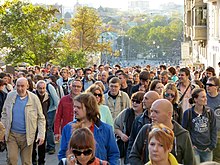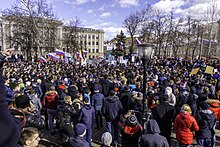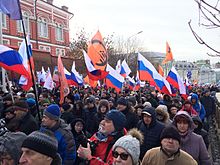Opposition to Vladimir Putin in Russia: Difference between revisions
m fix image options |
Rescuing 2 sources and tagging 0 as dead. #IABot (v1.5.2) (Josve05a) |
||
| Line 17: | Line 17: | ||
==Actions and campaigns of the opposition== |
==Actions and campaigns of the opposition== |
||
Current campaigns of the opposition: |
Current campaigns of the opposition: |
||
*'''Dissemination of anti-Putin reports''': ''Putin. Results. 10 years'' (2010), ''[[Putin. Corruption]]'' (2011), ''Life of a Slave on Galleys'' (2012). Video versions of these reports, entitled ''Lies of Putin’s regime'',<ref>https://www.youtube.com/playlist?list=PL3C2B9696AB409F76 |
*'''Dissemination of anti-Putin reports''': ''Putin. Results. 10 years'' (2010), ''[[Putin. Corruption]]'' (2011), ''Life of a Slave on Galleys'' (2012). Video versions of these reports, entitled ''Lies of Putin’s regime'',<ref>{{cite web |url=https://www.youtube.com/playlist?list=PL3C2B9696AB409F76 |title=Archived copy |accessdate=2016-11-26 |deadurl=yes |archiveurl=https://web.archive.org/web/20160723125255/https://www.youtube.com/playlist?list=PL3C2B9696AB409F76 |archivedate=2016-07-23 |df= }}</ref> have been viewed by about 10 million times on the Internet.<ref>{{cite web|url=http://b-nemtsov.livejournal.com/161491.html|title=Ролики "Ложь путинского режима"|first=|last=b_nemtsov|date=10 November 2012|publisher=}}</ref> |
||
In addition, smaller-scale series of actions are conducted. For example, in Moscow in the spring of 2012 saw a series of flash mobs "White Square", when protesters walked through the Red Square with white ribbons,<ref name="kasparov.ru"/> in the late spring and summer, they organized the protest camp "Occupy Abay" and autumn they held weekly "Liberty walks" with the chains symbolizing solidarity with political prisoners.<ref>{{cite web|url=http://grani.ru/Politics/Russia/activism/m.206856.html|title=Грани.Ру: В Москве задержаны участники "Прогулки свободы"|publisher=}}</ref> |
In addition, smaller-scale series of actions are conducted. For example, in Moscow in the spring of 2012 saw a series of flash mobs "White Square", when protesters walked through the Red Square with white ribbons,<ref name="kasparov.ru"/> in the late spring and summer, they organized the protest camp "Occupy Abay" and autumn they held weekly "Liberty walks" with the chains symbolizing solidarity with political prisoners.<ref>{{cite web|url=http://grani.ru/Politics/Russia/activism/m.206856.html|title=Грани.Ру: В Москве задержаны участники "Прогулки свободы"|publisher=}}</ref> |
||
| Line 26: | Line 26: | ||
Some opposition figures, for example, [[Garry Kasparov]], said there are no elections in Putin's Russia,<ref>{{cite web|url=http://www.svoboda.org/a/24211764.html|title="Выборов, которые приведут к отстранению Путина от власти, в России быть не может. Надо четко зафиксировать наш призыв к демонтажу существующей системы. Она убивает будущее России. Выживание путинского режима – это гибель страны. Вот об этом надо говорить, а не соблазнять людей предвыборными пустышками"|publisher=}}</ref><ref>{{cite web|url=http://grani.ru/blogs/free/entries/207410.html|title=Грани.Ру - Юрий Староверов: Марш регионов вместо иллюзий|publisher=}}</ref> and that participation in a procedure called elections only legitimizes the regime. |
Some opposition figures, for example, [[Garry Kasparov]], said there are no elections in Putin's Russia,<ref>{{cite web|url=http://www.svoboda.org/a/24211764.html|title="Выборов, которые приведут к отстранению Путина от власти, в России быть не может. Надо четко зафиксировать наш призыв к демонтажу существующей системы. Она убивает будущее России. Выживание путинского режима – это гибель страны. Вот об этом надо говорить, а не соблазнять людей предвыборными пустышками"|publisher=}}</ref><ref>{{cite web|url=http://grani.ru/blogs/free/entries/207410.html|title=Грани.Ру - Юрий Староверов: Марш регионов вместо иллюзий|publisher=}}</ref> and that participation in a procedure called elections only legitimizes the regime. |
||
On the other hand, a small part of liberals (the party of "Democratic Choice") consider elections as the main tool to achieve their political goals.<ref>{{cite web|url=http://demvybor.ru/about.html|title=О нас. Что такое "Демократический выбор"?|publisher=Демократический выбор|accessdate=2010-06-21|archiveurl= |
On the other hand, a small part of liberals (the party of "Democratic Choice") consider elections as the main tool to achieve their political goals.<ref>{{cite web|url=http://demvybor.ru/about.html|title=О нас. Что такое "Демократический выбор"?|publisher=Демократический выбор|accessdate=2010-06-21|archiveurl=https://www.webcitation.org/67I8CaNvB?url=http://demvybor.ru/about.html|archivedate=2012-04-29|deadurl=yes|df=}}</ref> The system opposition also supports participation in elections. |
||
==Protests against election fraud== |
==Protests against election fraud== |
||
Revision as of 17:39, 14 September 2017
You can help expand this article with text translated from the corresponding article in Russian. (January 2013) Click [show] for important translation instructions.
|
This article needs to be updated. (April 2017) |
This article's factual accuracy may be compromised due to out-of-date information. (April 2017) |
This article is missing information about Error: you must specify what information is missing.. (April 2017) |

 |
|---|
Opposition to President Vladimir Putin in Russia is a term that can be divided between the parliamentary opposition parties in the State Duma and the various non-systemic opposition organizations. While the former are largely viewed by political commentators and analysts as being more or less loyal to President Putin, the latter oppose his leadership and remain mostly unrepresented in government bodies. Major political parties considered to be part of the non-systemic opposition include Yabloko and the People's Freedom Party (also referred to as PARNAS), along with the unregistered Progress Party. Other notable opposition groups included the Russian Opposition Coordination Council (2012–13), Other Russia (2006–11), as well as various non-governmental organizations (NGOs).
Their supporters vary in political ideology, ranging from liberals and socialists to nationalists and monarchists, as well as apolitical individuals. They are mainly unified by their opposition to President Putin and the corruption in the government. Among the main problems noted by analysts is that the non-systemic opposition movements lack unity and capable leadership. Leading members of the opposition have become targets of violence, including assassinations and harassment, which they allege can be attributed to the government of Vladimir Putin. Opposition figures also claim that a number of laws have been passed and other have measures taken by Putin to prevent them from having any electoral success. Since the beginning of the Ukraine crisis, their detractors label the non-systemic opposition as being "fifth columnists" and unpatriotic.
Background and white-ribbon opposition

Most opposition organizations independent from the Kremlin encounter a restrictive law on political parties, refusals of registration by the Justice Ministry, censorship in major mass media, primarily federal TV channels. According to Vladimir Ryzhkov, "over the last 4 years (i.e. from 2007 - Ed.) for identical "formal reason" nine political parties were denied registration - from left to right. And not any new party was registered. In modern Russia, this is not possible".[1]
Since 2012 for the protesters for fair elections the term white ribbon opposition has been applied, as they wore white ribbons as their symbol.[2]
Actions and campaigns of the opposition
Current campaigns of the opposition:
- Dissemination of anti-Putin reports: Putin. Results. 10 years (2010), Putin. Corruption (2011), Life of a Slave on Galleys (2012). Video versions of these reports, entitled Lies of Putin’s regime,[3] have been viewed by about 10 million times on the Internet.[4]
In addition, smaller-scale series of actions are conducted. For example, in Moscow in the spring of 2012 saw a series of flash mobs "White Square", when protesters walked through the Red Square with white ribbons,[2] in the late spring and summer, they organized the protest camp "Occupy Abay" and autumn they held weekly "Liberty walks" with the chains symbolizing solidarity with political prisoners.[5]
A Monstration is a parody demonstration[6] where participants gently poke fun at Kremlin policies.[7]
Participation in elections
Some opposition figures, for example, Garry Kasparov, said there are no elections in Putin's Russia,[8][9] and that participation in a procedure called elections only legitimizes the regime.
On the other hand, a small part of liberals (the party of "Democratic Choice") consider elections as the main tool to achieve their political goals.[10] The system opposition also supports participation in elections.
Protests against election fraud

Starting from 5 December 2011, the day after the elections to the State Duma, there have been repeated massive political actions of Russian citizens who disagree with the outcome of these "elections". The current surge of mass opposition rallies has been called in some publications "a snow revolution".[11][12][13][14] These rallies continued during the campaign for the election of the President of Russia and after March 4, 2012 presidential election, in which Putin officially won the first round. The protesters claimed that the elections were accompanied by violations of the election legislation and widespread fraud. One of the main slogans of the majority of actions was "For Fair Elections!" and a white ribbon has been chosen as symbol of protests. Beginning from spring 2012 the actions were called marches of millions and took the form of a march followed by a rally. The speeches of participants were anti-Putin and anti-government.
The "March of Millions" on 6 May 2012 at the approach to Bolotnaya Square was dispersed by the police. In the Bolotnaya square case 17 people are accused of committing violence against police (12 of them are in jail). A large number of human rights defenders and community leaders have declared the detainees innocent and the police responsible for the clashes.[15][16]
For the rally on December 15, 2012, the anniversary of the mass protests against rigged elections, the organizers failed to agree with the authorities, and participation was low. Several thousand people gathered without placards on Lubyanka Square and laid flowers at the Solovetsky Stone.[17]
March for Peace

In 2014, members of the Russian opposition have held anti-war protests in opposition to Russian military intervention in Ukraine in the aftermath of the 2014 Ukrainian revolution and Crimean crisis. The March of Peace protests took place in Moscow on March 15, a day before the Crimean referendum. The protests have been the largest in Russia since the 2011 protests. Reuters reported that 30,000 people participated in the March 15 anti-war rally.[18]
Suppression of opposition
This section is empty. You can help by adding to it. (July 2015) |
2017 Russian protests

On March 26, 2017, protests against alleged corruption in the Russian government took place simultaneously in many cities across the country. An April 2017 Levada poll found that 45% of surveyed Russians supported the resignation of Russian Prime Minister Dmitry Medvedev,[19] against it 33% of respondents. Newsweek reported that "An opinion poll by the Moscow-based Levada Center indicated that 38 percent of Russians supported the rallies and that 67 percent held Putin personally responsible for high-level corruption."[20]
Opposition figures


- Lyudmila Alexeyeva
- Maria Alyokhina
- Maria Baronova
- Yevgeniya Chirikova
- Vladimir Vladimirovich Kara-Murza
- Garry Kasparov
- Mikhail Kasyanov
- Mikhail Khodorkovsky
- Eduard Limonov
- Alexei Navalny
- Boris Nemtsov
- Valeriya Novodvorskaya
- Ilya Ponomarev
- Leonid Razvozzhayev
- Vladislav Ryazantsev
- Vladimir Ryzhkov
- Yekaterina Samutsevich
- Yuri Shevchuk
- Nadezhda Tolokonnikova
- Sergei Udaltsov
- Ilya Yashin
- Grigory Yavlinsky
- Vyacheslav Maltsev
See also
- Non-system opposition
- Dissenters' March
- Putinism
- Reaction of Russian intelligentsia to the 2014 annexation of Crimea
References
- ^ Владимир Рыжков: Отказ в регистрации оппозиционных партий делает выборы в России нелегитимными. 27 июня 2011 г.
- ^ a b "Стой! Кто идет?".
- ^ "Archived copy". Archived from the original on 2016-07-23. Retrieved 2016-11-26.
{{cite web}}: Unknown parameter|deadurl=ignored (|url-status=suggested) (help)CS1 maint: archived copy as title (link) - ^ b_nemtsov (10 November 2012). "Ролики "Ложь путинского режима"".
- ^ "Грани.Ру: В Москве задержаны участники "Прогулки свободы"".
- ^ "Russian Labor Day: Rallies, ridicule and revelry as tens of thousands take part". Russia Today. 1 May 2013. Retrieved 1 May 2013.
- ^ "Moscow threatens to block BBC Russian service Service". Z News. 5 August 2014. Retrieved 5 August 2014.
- ^ ""Выборов, которые приведут к отстранению Путина от власти, в России быть не может. Надо четко зафиксировать наш призыв к демонтажу существующей системы. Она убивает будущее России. Выживание путинского режима – это гибель страны. Вот об этом надо говорить, а не соблазнять людей предвыборными пустышками"".
- ^ "Грани.Ру - Юрий Староверов: Марш регионов вместо иллюзий".
- ^ "О нас. Что такое "Демократический выбор"?". Демократический выбор. Archived from the original on 2012-04-29. Retrieved 2010-06-21.
{{cite web}}: Unknown parameter|deadurl=ignored (|url-status=suggested) (help) - ^ "Ежедневный Журнал: Координационный совет накануне выборов".
- ^ "Высокий градус русской зимы".
- ^ Андерс Аслунд. Урок для России. Снежная революция не должна повторить ошибки Оранжевой. — KievPost, 22.02.2012
- ^ "Протест против Путина: "снежная революция" в России тает".
- ^ "За права человека — Общероссийское общественное движение".
- ^ "Грани.Ру: В Москве прошел митинг в поддержку "узников Болотной"".
- ^ "Стояние у Соловецкого камня: Итоги запрещенной оппозиционной акции".
- ^ "Ukraine crisis triggers Russia's biggest anti-Putin protest in two years". Reuters. 15 March 2014. Retrieved 16 March 2014.
- ^ "Russian Polls Do Mean Something After All". Bloomberg. April 26, 2017.
- ^ "Alexei Navalny: Is Russia's Anti-Corruption Crusader Vladimir Putin's Kryptonite?". Newsweek. April 17, 2017.
External links
- List of political prisoners in Russia (Russian) in 2015, compiled by "New Chronicle of Current Events".
